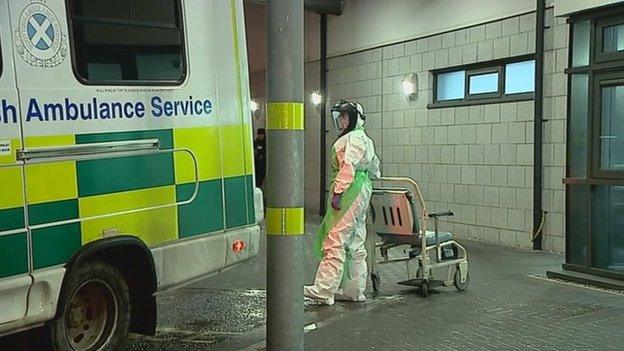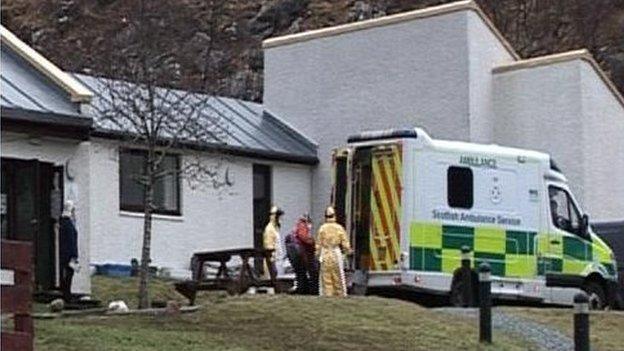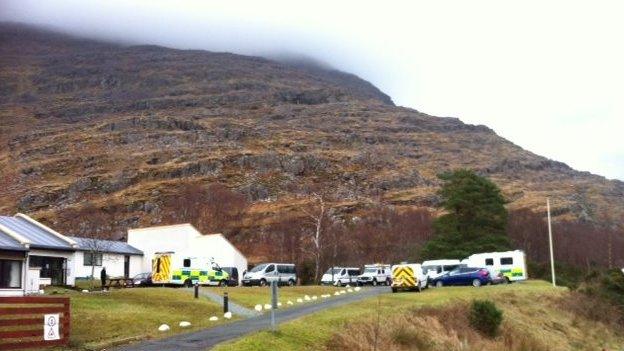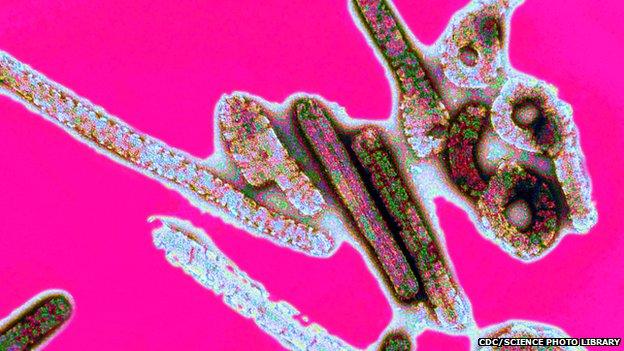Second woman being tested for Ebola in Scotland after Aberdeen transfer
- Published

The woman was taken to the infection unit at Aberdeen Royal Infirmary
A second healthcare worker is being tested for Ebola in Scotland after returning from West Africa.
The woman, who had been staying at the Torridon Youth Hostel in the Highlands, has been transferred to Aberdeen Royal Infirmary.
However, First Minister Nicola Sturgeon stressed that the case was being treated as "low probability".
The woman is not thought to have come into contact with anyone who had contracted Ebola.
She was taken from the Torridon Youth Hostel by ambulance staff wearing protective suits, after complaining of feeling unwell.
It is thought she was amongst a party of around 30 people who had hired out the youth centre.
She later arrived at the infection unit at Aberdeen Royal Infirmary where she was taken into the building surrounded by medical staff in protective clothing.

The woman was taken from the Torridon Youth Hostel in the Highlands by ambulance staff in protective suits

It is thought the woman was amongst a party of about 30 people who had hired out the youth centre
The patient was described as "stable and not giving any cause for clinical concern".
NHS Highland said the woman had recently returned from Sierra Leone, and was moved in a specially-equipped ambulance.
It comes after a health worker was diagnosed with Ebola after returning to Scotland from Sierra Leone.
She has been transferred from Gartnavel Hospital in Glasgow to a specialist treatment centre at the Royal Free Hospital in London.
The patient, who had been working with Save the Children in Sierra Leone, arrived in Glasgow on a British Airways flight on Sunday but was placed in an isolation unit at Gartnavel on Monday morning after becoming feverish.
Ms Sturgeon said the risk to the public from that case was "extremely low to the point of negligible".
The first minister told BBC Radio's Good Morning Scotland programme that she was also being kept updated on the second potential case.
She said: "I should stress that, although this is another returning healthcare worker from West Africa, the patient here, as far as we are aware, has had no direct contact with people infected with Ebola, so it is a case that is being described as low probability.

The Ebola virus causes a range of painful and debilitating symptoms
"But we are operating, given the seriousness of Ebola, on a highly precautionary basis and that's why this patient over the course of today will be transferred for tests."
Ebola is transmitted by direct contact with the bodily fluids - such as blood, vomit or faeces - of an infected person.
The early symptoms are a sudden fever, muscle pain, fatigue, headache and sore throat.
This is followed by vomiting, diarrhoea, a rash and bleeding - both internal and external - which can be seen in the gums, eyes, nose and in the stools.
Patients tend to die from dehydration and multiple organ failure.